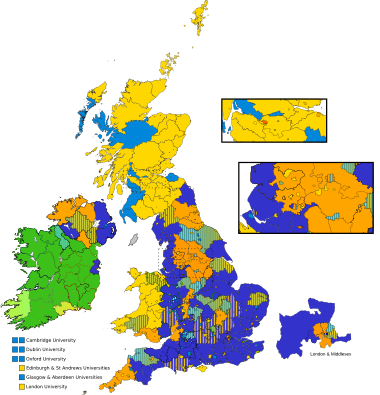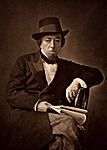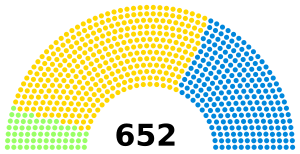1880 United Kingdom general election facts for kids
|
|||||||||||||||||||||||||||||||||||||||||||||
|
|
|||||||||||||||||||||||||||||||||||||||||||||
|
All 652 seats in the House of Commons 327 seats needed for a majority |
|||||||||||||||||||||||||||||||||||||||||||||
|---|---|---|---|---|---|---|---|---|---|---|---|---|---|---|---|---|---|---|---|---|---|---|---|---|---|---|---|---|---|---|---|---|---|---|---|---|---|---|---|---|---|---|---|---|---|
|
|||||||||||||||||||||||||||||||||||||||||||||

Colours denote the winning party
|
|||||||||||||||||||||||||||||||||||||||||||||
|
|||||||||||||||||||||||||||||||||||||||||||||
The 1880 United Kingdom general election was a big election held in the United Kingdom from March 31 to April 27, 1880. During a general election, people vote for members of Parliament (MPs) to represent them in the House of Commons. The party that wins the most seats usually forms the government.
This election was very exciting. The Liberals, led by William Gladstone, ran a strong campaign. Gladstone gave powerful speeches, especially during his "Midlothian campaign." He strongly criticized the foreign policy of the government led by Benjamin Disraeli, who was then known as the Earl of Beaconsfield. Gladstone called Disraeli's policies "immoral."
The Liberals won a huge victory, getting one of their largest majorities ever. The Conservatives came in a distant second. Because of this big win, William Gladstone became the Prime Minister for the second time. This election was the last time any party other than the Conservatives won more than half of all the votes.
| Top - 0-9 A B C D E F G H I J K L M N O P Q R S T U V W X Y Z |
Key Issues in the 1880 Election
The Conservative government faced two main problems that led to their defeat. These were the struggling economy and strong criticism of their foreign policy.
Economic Troubles for Britain
The 1870s were a tough time for Britain's economy. There was a worldwide economic slowdown, sometimes called the "Long Depression." This meant that prices, profits, and jobs all decreased. Many working-class families faced hardship because wages were falling.
Britain also had a policy of free trade, which meant goods could enter the country without high taxes. This made it hard for British farmers to compete with cheap wheat coming from North America. The situation got even worse in 1879, which had the worst harvest of the century in Britain. People blamed the party in power, the Conservatives, for these economic difficulties. The Liberals often pointed out the growing budget deficit, showing that the government was not managing money well.
Criticism of Foreign Policy
William Gladstone and the Liberals strongly attacked Benjamin Disraeli's foreign policy. Gladstone, who was very religious and believed in strong morals, said Disraeli's actions on the world stage were wrong. He argued that Disraeli's policies led to expensive and unnecessary adventures abroad. Gladstone also claimed these policies were bad for peace and hurt smaller nations.
Historians say that while some of Gladstone's points had truth, much of his criticism was exaggerated. It was part of a big political fight, similar to how Disraeli had criticized the Liberals in the past.
Disraeli's Challenges
Benjamin Disraeli, as the Earl of Beaconsfield, was now a member of the House of Lords. This meant he could not actively campaign or give speeches to the public during the election. This made it hard for his party to fight back against Gladstone's powerful speeches.
Even though Disraeli had worked to make the Conservative Party more organized, he was mostly connected with wealthy landowners in the countryside. He didn't have a good understanding of the growing middle class in cities, who were becoming more important in politics. This lack of connection also hurt his party's chances.
Election Results
The election results showed a clear win for the Liberals. Disraeli's Conservative Party lost many seats, especially in Scotland, Ireland, and the cities.
| UK General Election 1880 | |||||||||||||||
|---|---|---|---|---|---|---|---|---|---|---|---|---|---|---|---|
| Party | Candidates | Votes | |||||||||||||
| Stood | Elected | Gained | Unseated | Net | % of total | % | No. | Net % | |||||||
| Liberal | 499 | 352 | +132 | -22 | +110 | 53.99 | 54.66 | 1,836,423 | +2.7 | ||||||
| Conservative | 521 | 237 | +20 | -133 | −113 | 36.35 | 42.46 | 1,426,351 | −1.8 | ||||||
| Home Rule | 81 | 63 | +6 | -3 | +3 | 9.66 | 2.84 | 95,535 | −0.9 | ||||||
| Independent | 2 | 0 | 0 | 0 | 0 | 0 | 0.03 | 1,107 | 0 | ||||||
How People Voted
This chart shows the percentage of votes each main party received:
| Popular vote | ||||
|---|---|---|---|---|
| Liberal | 54.66% | |||
| Conservative | 42.46% | |||
| Home Rule | 2.84% | |||
| Others | 0.03% | |||
Seats Won in Parliament
This chart shows how many seats each party won in the House of Commons:
| Parliamentary seats | ||||
|---|---|---|---|---|
| Liberal | 53.99% | |||
| Conservative | 36.35% | |||
| Home Rule | 9.66% | |||
Images for kids
-
A painting by Alfred George Palmer of election night outside Exeter Guildhall
-
Crowds wait outside Leeds Town Hall to hear the result
See also
- List of MPs elected in the 1880 United Kingdom general election
- 1880 United Kingdom general election in Ireland
- 1880 United Kingdom general election in Scotland
 | Janet Taylor Pickett |
 | Synthia Saint James |
 | Howardena Pindell |
 | Faith Ringgold |







